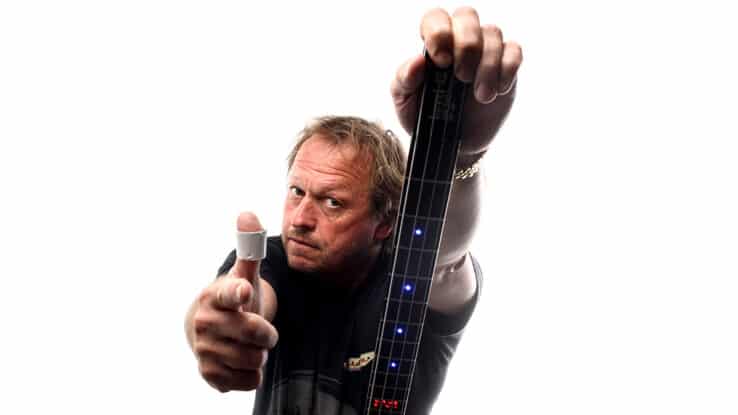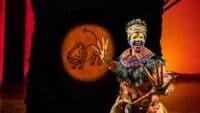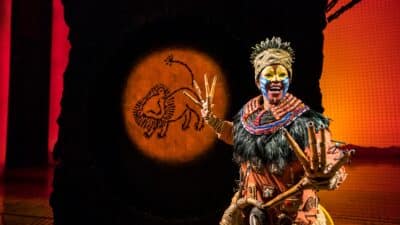Interview

Showstoppers
Mark King of Level 42 on the story behind ‘The Sun Goes Down (Livin’ It Up)’
The songwriter, vocalist and bassist takes us behind the curtain of one of his band’s most memorable tracks
“Look, it’s a feel-good track…” says Mark King, attempting to understand the impossible mystery of a song’s enduring legacy. We can search for deeper, more profound meanings that allow for a song to resonate with listeners across decades. Or perhaps, and this can also be true: it’s just a stone-cold Summer banger. A song that makes you feel happy. A song that makes you wanna dance. Or as King puts it, “a song that stinks of sunshine when you hear it”.
Speaking to us from his home, in front of a wall plastered with guitars (we counted eight, in total), King is one of the founding members of the Isle of Wight jazz-rock outfit Level 42. Alongside Mike Lindup, as well as brothers Phil and Boon Gould, King is best renowned for his striking bass playing – and a thumb that was insured for millions.
It’s that very thumb that contributes to the ineffable, immediately distinctive sound of ‘The Sun Goes Down’. As for the feel-good factor, King puts it down to the time and place it came from.
“It is exactly how the band were feeling at that moment in time,” he begins. “We’d been touring in Europe, and Larry Dunn and Verdine White from Earth, Wind & Fire got in touch through our record company to see whether we’d be interested in them producing an album for us in the States. It was such an incredible opportunity, way too good to miss – to get the chance to go and work in the land of all your heroes.
“We were there for three months in their studio called The Complex,” King continues. “We had nothing when we went over there, except one song that we had pre-recorded, so we just all sat round in the studio going, ‘what have we got?’ and then everybody started jamming around on this riff, and it was just a really nice groove. It had the right sort of vibe for how we were feeling at the time, because this was April 1983, summer was coming and everything had that feel-good factor. Phil caught that beautifully in the lyrics.”
Spending a summer in the hazy sun-baked California sunshine infected and informed the crafting of this soon-to-be popular hit. The band were in touch with nature, with all the elements (literally with Earth, Wind and Fire). “When mixing the album, which we did at Indigo Ranch, up in the hills in North Hollywood, we’re floating around having this whale of a time playing on the games consoles they had there, but then walking out of the door and seeing the most incredible wall of stars above your head that you only get when looking out over the Pacific Ocean on a beautiful, clear Californian night – it was absolutely stunning. All of that has to be in the music there somewhere, and I believe you do feel that with ‘The Sun Goes Down’.”
There’s an effervescence of youth to this song, a nostalgia-infused harking back to the halcyon days, when you could stay up all night without having to worry about the babysitter. But it’s by no means a track that survives purely on those terms; for it carries a meaningful bridge, where King himself sings the simple yet potent line “I don’t wanna go to war”. Though naturally fans would imagine this to be a political statement (the band are anti-war, of course) – the true meaning behind this addition to the track came from a somewhat unexpected place.
“That section was inspired by our flight over,” King explained. “On one of the audio channels there was a comedy show and there were a few things that made all of us laugh on there, just to pass the time. One of them was a protest song, and I can’t remember the name of the comedian doing the sketch, but he said “what is it with hippies, all these protest songs I’m getting these days? ‘I don’t wanna go to war… I don’t wanna go to war… but I don’t wanna get a job either…’”, and it was kind of a cynical attack on the peace and love movement, which of course was on its way out then anyway,” he continued.
“So when we got to the middle section of ‘The Sun Goes Down’, to try and get vocal ideas we very often used to vocalise melodic ideas and so I got in front of the mic at this particular point in the song and I started going ‘I don’t wanna go to war, I don’t wanna go to war’, which was just an in-joke for us, but we ran with it.”
King’s distinctive vocals make this maybe the most memorable part of the record, certainly the most sing-a-long. At least Chaka Khan thought so.
“We were doing a festival, and the great Chaka Khan was performing there. I had no idea that we’d been on her radar because she’s such a Queen of soul, but she summoned me into her dressing room and she just said ‘Mark – the way you sang ‘I don’t wanna go to war!’’ and she just started singing me back that line, which was really bizarre.”
Khan is just one of many fans of Level 42, who have been performing to a dedicated and loyal fan-base for the last four decades. Fans who will travel the world to see the band play – meaning, naturally, they’ll see ‘The Sun Goes Down’ performed live multiple times, as a song that’s effectively a guarantee at any given show. But do the band ever get bored of playing the hits?
“No, we never get bored – how could you?” King said. “It’s exciting when you have a song in its first instance, when it’s a new track, but there comes a point when you’ve done these songs so many times, that you reach the peak version of the song. I’m really happy to say that we’re there with so much of the material that we play.”
“Plus it’s a great song to play live,” he adds. “Everybody responds so beautifully to Mike carrying the song the way that he does. It feels like a real party vibe, and I am all for that – that’s what we’re there to do, to bring a bit of light into people’s lives. Everybody gets a couple of hours off from the stresses and mundanities that we all seem to have to live under the rest of the time.”
At what point, though, could he tell he was onto a winner? “The ones I’d have put my house on didn’t really do the business, and the others just always caught me by surprise,” he laughs. “Some people can hear it, and other people can’t. In hindsight you always go, ‘well obviously it was a hit’ – I just wish I knew it beforehand.”
The song cracked the UK top 10 upon its release, making it Level 42’s biggest single to date. Subsequently came the inclination to try and replicate that success, to find whatever formula that worked and do it again. For King, it was vital that they avoided that trap.
“Of course you have to follow it up. You’ve got to come up with something else afterwards. But you also try not to fall into the same thinking. It seems to me that people who try to work on formula have quite a short shelf life, because it’s like, here we go again. ‘The Sun Goes Down’ was as different to what preceded it, to what came after. That’s just the way we roll when we’re making songs.”
Ultimately, the band’s longevity, and the reason they’re still playing to packed audiences today, transcends individual tracks, no matter how popular they may be. ‘The Sun Goes Down’ was a hit then, and continues to engage and delight audiences today. But really, it’s dedication that keeps Level 42 going.
“We were continuingly gigging, and if we weren’t playing festivals we were doing a tour of our own, and that just went on and on. That’s what gets you benefits, because you reach new audiences all of the time.”
“At the base of everything, is just good old-fashioned hard work”.
Get tickets for Level 42’s October UK tour
Photo credit: Richard Ecclestone/Redferns









